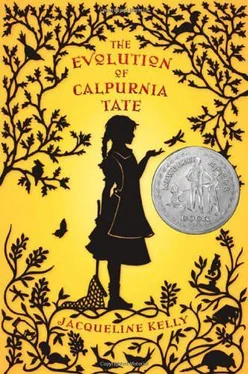Jacqueline Kelly - The Evolution of Calpurnia Tate
Здесь есть возможность читать онлайн «Jacqueline Kelly - The Evolution of Calpurnia Tate» весь текст электронной книги совершенно бесплатно (целиком полную версию без сокращений). В некоторых случаях можно слушать аудио, скачать через торрент в формате fb2 и присутствует краткое содержание. Город: New York, Год выпуска: 2009, ISBN: 2009, Издательство: Macmillan : Henry Holt and Company, Жанр: Детская проза, на английском языке. Описание произведения, (предисловие) а так же отзывы посетителей доступны на портале библиотеки ЛибКат.
- Название:The Evolution of Calpurnia Tate
- Автор:
- Издательство:Macmillan : Henry Holt and Company
- Жанр:
- Год:2009
- Город:New York
- ISBN:978-0-8050-8841-0
- Рейтинг книги:5 / 5. Голосов: 1
-
Избранное:Добавить в избранное
- Отзывы:
-
Ваша оценка:
- 100
- 1
- 2
- 3
- 4
- 5
The Evolution of Calpurnia Tate: краткое содержание, описание и аннотация
Предлагаем к чтению аннотацию, описание, краткое содержание или предисловие (зависит от того, что написал сам автор книги «The Evolution of Calpurnia Tate»). Если вы не нашли необходимую информацию о книге — напишите в комментариях, мы постараемся отыскать её.
The Evolution of Calpurnia Tate — читать онлайн бесплатно полную книгу (весь текст) целиком
Ниже представлен текст книги, разбитый по страницам. Система сохранения места последней прочитанной страницы, позволяет с удобством читать онлайн бесплатно книгу «The Evolution of Calpurnia Tate», без необходимости каждый раз заново искать на чём Вы остановились. Поставьте закладку, и сможете в любой момент перейти на страницу, на которой закончили чтение.
Интервал:
Закладка:
Dear Mr. Tate and Miss Tate:
We, the members of the Plant Taxonomy Committee of the Smithsonian Institution, are pleased to inform you that, after much research and study, we have concluded that you have identified a new species of hairy vetch heretofore unknown. The class is Dicotyledon; the order is Fabales; the family is Fabaceae; the genus is Vicia. It is customary for the first identifier to have the species named after him, or any name he chooses, so long as it is not already in use. May we suggest to you that the plant be known as Vicia tateii? Such would be in keeping with the regular customs of taxonomy. You may, however, elect to name the plant otherwise. The choice is yours. The Institution congratulates you on your perspicacious find. We remain, yours in Science, et cetera,
Henry C. Larivee, President Taxonomy Committee, PlantsI carefully refolded the paper in my lap and then looked at him. Motionless, he stared off into space for a long time. I felt an urgent need to say something, but I didn’t know what. I couldn’t sort anything out. The room was completely still. Far off in the distance, a dog howled. It was Matilda, sounding her unique yodeling call. Odd that she would register with me at that moment. Closer at hand, a pan clattered in the kitchen. The wooden screen door banged shut, and a couple of my brothers scuffled past in the hall. We heard the piano start up in the parlor, a limpid, haunting melody; Harry had been pressed into playing for our visitors. The music drew my grandfather back from wherever it was he’d gone. His face was wistful, contemplative, sad.
“Yes,” he said at last.
“Yes?” I didn’t know what else to say.
A minute later, he said, “It’s Chopin. I have always liked that piece. Do you know, Calpurnia . . .” He trailed off.
“Yes, Granddaddy?”
“Do you know . . .”
“Yes, Granddaddy?”
“That I have always liked it best. Of all his work.”
“No. I didn’t know.”
“It’s commonly called ‘The Raindrop.’”
“I didn’t know that.”
I could hear Viola ringing the dinner bell on the back porch. Soon she would sound the gong at the foot of the stairs.
He ignored the bell. “The only question, really, is how are we to spend the brief time that is allotted us?”
I wondered if we were going to talk about the telegram. I didn’t want the gong to sound. Dinner was only dinner; dinner could wait. By rights we should be free to sit there forever. I looked around the room. I looked at the books, the armadillo, the bottled beast.
“Granddaddy?”
“Yes?”
“What about the telegram?”
“What about it?”
“Well . . .” Viola pounded on the gong. The sound was intrusive, hateful.
“Do you have any questions about it?” he asked.
“No,” I said slowly, “I guess not.”
“Were you ever in any doubt?”
“I suppose not, but—”
“There are so many things to learn, you see, and so little time is given us. I am old. I thought I would die before it happened.”
I stood up and went to him. I tried to hand him the telegram, but he said, “You keep it. Press it in your Notebook.”
I pocketed it and put my arms around him. He slipped his arm around me and kissed me, and we leaned together awhile until the inevitable knock came at the door.
I HAD EXPECTED a celebration. I had expected streamers and cake and confetti. I had expected our family to hoist us on their shoulders and carry us aloft in triumph. But Granddaddy never said a word all through dinner, and I spent the meal feeling lifeless. What was wrong with me? Why did I feel so flat on what should have been the happiest day of my life, and my grandfather’s life?
Mother glanced at Granddaddy all through dinner and smiled and nodded encouragement at him whenever he looked up, giving him every opportunity to explain the once-in-a-lifetime communication, but instead he chose to apply himself to his plate. Generalized rustling and surreptitious glances from my brothers indicated that they knew something was afoot.
We ate our dinner. It wasn’t until SanJuanna was clearing the dessert course that Granddaddy went to the sideboard and poured himself a generous measure of port. He held his glass aloft until the table quieted and all eyes were on him. The port caught the light from the chandelier and splashed a ruby wave across his beard.
He looked like he was about to address us, but then he turned and pushed open the swinging door to the kitchen and called out for Viola to come into the dining room. She hurried in, wiping her hands on her apron, her brow furrowed in concern.
“Ladies”—he bowed—“gentlemen, I propose a toast. Something rather wonderful has happened. Today I received a telegram from Washington. It came from the Smithsonian Institution, informing me, and Calpurnia, that we have discovered a new species of vetch. A previously unknown specimen. It is henceforth to be called Vicia tateii.”
Father said, “Well done!”
Mother studied Granddaddy with a puzzled expression, and then turned her gaze to me.
Harry said, “Grandfather, you’ve put our name down in history.”
“Did you win a prize, Callie?” said Jim Bowie. “What did you win?”
“We won a place in the science books,” I said.
“What books? What does that mean? Will we get to see them?”
“You will one day, J.B.”
Father started clapping and the others followed with applause and hoorays. Here is what I had been waiting for, and it did make me feel more cheerful, although not as much as you’d think.
Father joined Granddaddy at the sideboard, poured himself a good dose of port, and said, “Margaret, will you join us?”
Mother scrutinized me.
“Margaret?”
“Oh,” she said, and turned to Father. “Perhaps a small one, Alfred, seeing as it’s a special occasion.”
Granddaddy said, “Viola, won’t you have a glass?”
Viola glanced at Mother and then said, “No, no, Mr. Tate, I couldn’t—”
He ignored her and shoved a glass into her hands and then another into SanJuanna’s hands—she looked like she would faint. They all stood and raised their glasses. We imitated them with glasses of milk.
Father spoke. “To our good health, to our continuing prosperity and, on this grand occasion, to Grandfather and his scientific endeavors. I must admit that there were times when I wondered about the way you spend your time, but you have proven it to be all worth the while. We are a proud family tonight!”
Harry started up a chorus of “For He’s a Jolly Good Fellow” and then led them all in giving three cheers.
“Let’s not forget Calpurnia,” said Harry, “with her Notebook. I claim some credit for your accomplishments, pet, for having given it to you. Well done.”
Another cheer, this time aimed at me. I had to smile at their bright, excited faces.
“It’s true,” said Granddaddy, raising his glass in my direction. “None of this would have happened without the help of my only grandchild, Calpurnia.” He drank serenely.
His only grandchild! There was stunned silence from my brothers, followed by a rising swell of muttering and hissing.
“Pardon me,” said Granddaddy, catching his mistake and bowing. “I meant, of course, my only granddaughter.” He calmly drank and then sat down. My brothers were in a snit, but I didn’t care. My heart pumped gladness through my veins. I was all to him, wasn’t I? And he was all to me.
Chapter 27
NEW YEAR’S EVE
Man can hardly select, or only with much difficulty, any deviation of structure excepting such as is externally visible; and indeed he rarely cares for what is internal.
Интервал:
Закладка:
Похожие книги на «The Evolution of Calpurnia Tate»
Представляем Вашему вниманию похожие книги на «The Evolution of Calpurnia Tate» списком для выбора. Мы отобрали схожую по названию и смыслу литературу в надежде предоставить читателям больше вариантов отыскать новые, интересные, ещё непрочитанные произведения.
Обсуждение, отзывы о книге «The Evolution of Calpurnia Tate» и просто собственные мнения читателей. Оставьте ваши комментарии, напишите, что Вы думаете о произведении, его смысле или главных героях. Укажите что конкретно понравилось, а что нет, и почему Вы так считаете.












